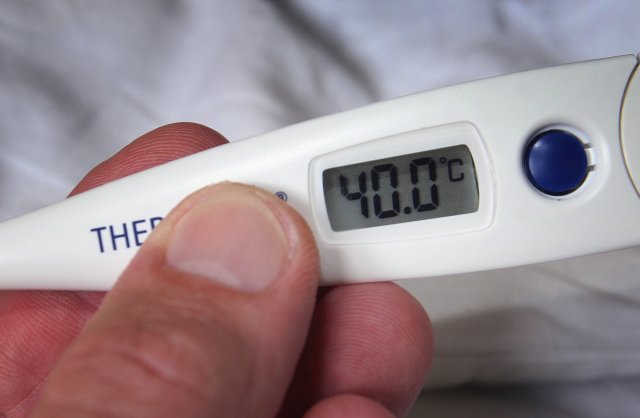A fever of up to 40 degrees is usually not dangerous for an adult.
Photo: dpa/Karl-Josef Hildenbrand
Why do sick people get a fever?
It is usually part of the immune response to an infection. Sometimes also due to a pathogen that itself produces toxins that cause the body temperature to rise. However, fever is much more often a part of the immune system. When the body is infected by viruses or bacteria, an immune reaction is triggered. And some of the immune messengers ensure that the temperature control system in the brain notices that something is going wrong and then knows: we need to heat up.
When my children have a fever, I grab their heads. Why does the head get particularly hot and not, for example, the feet?
The feet are a little further away from the heart; they are usually a little cooler. But the main reason is probably more practical: the forehead is exposed and easy to reach. You don’t feel the temperature as well through the socks.
Dr. Schmidt explains the world
Dr. Steffen Schmidtborn in 1952, is the editorial team’s polymath. He knows an answer to almost every question – and if he doesn’t, he answers another one. Christian Klemm talked to him about fever.
My children occasionally had a body temperature of 39 or 40 degrees Celsius. The pediatrician told me earlier that it wasn’t serious.
True.
It’s different for adults, isn’t it?
Fever up to 40 degrees is not necessarily dangerous, even for adults. But one should be careful because sepsis sometimes develops in the body. The fever gets very high very quickly. If that’s the case, go to the hospital!
How much fever can a person endure?
Up to 41 degrees approximately. Then things start to get problematic. Various proteins coagulate at 43 degrees.
What happens then?
Well, our cells are made of proteins. If some clot, the cells no longer function correctly. The chicken can no longer hatch a boiled egg.
Washcloths on the forehead, calf wraps or fever juices – what do I do if I have a high fever?
I’m skeptical about whether reducing fever is always the right thing to do when you’re sick. If the fever is not very high, reducing the fever is statistically more likely to prolong the illness than shorten it. Because fever is part of the fight against disease. There are studies that make this clear.
So you shouldn’t fight the fever, but the infection.
Correctly. But this is difficult if you don’t know whether a virus or a bacteria is the cause of the illness. If it is a bacteria, then it may make sense to give an antibiotic. But if you have a viral infection, there’s usually not much you can do.
I had that experience too. I had the flu twice. The first time I even called the ambulance on a weekend; I practically couldn’t get out of bed. But then he said he couldn’t help me.
The dangerous thing about viral infections is that some can also damage cells in vital organs, such as the heart muscle or lungs. In the case of the so-called Spanish flu in 1918/19, this primarily affected the lungs. Thousands of people die from viral flu every year. That’s why vaccination makes sense.
We-don’t-give-each-other anything

Our Christmas campaign not only brings the joy of reading, but also warmth and festivity into the house. With the three-month trial subscription you get a pair of left socks from Socks with attitude and a bottle of sparkling wine Social Sector – perfect for a relaxed winter time. A gift that informs, warms and supports the dropout program EXIT Germany supports. Order a we-don’t-give-each-other gift now.
link sbobet sbobet88 link sbobet judi bola
